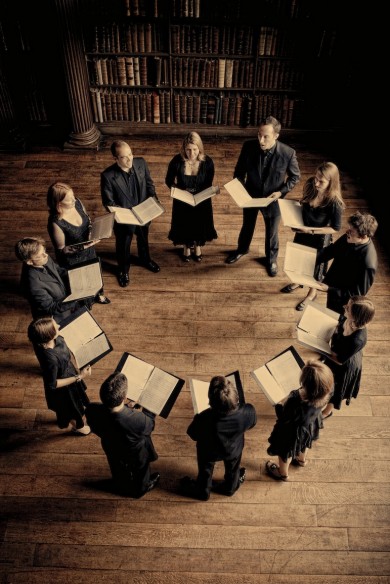Stile Antico closes Tropical Baroque Festival in worthy fashion

Stile Antico performed at the Tropical Baroque Music Festival Tuesday night in Miami Beach. Photo: Marco Borggreve
Stile Antico, a twelve member British a capella choral ensemble that has received wide acclaim for its recordings on the Harmonia Mundi label, concluded the Tropical Baroque Festival on Tuesday night with a program titled “Music for the House of Hapsburg” at Miami Beach Community Church.
The Hapsburg dynasty ruled much of Europe and its monarchs gathered some of the finest court composers of the era to create music for official imperial functions.
Concentrating on music from the 15th and 16th centuries, the conductorless group opened with Cristobal de Morales’ Jubilate Deo. Written to celebrate a peace treaty, Morales’ vocal writing is joyous but restrained. Equally divided between female and male voices, the choir sounded considerably larger, the blend of vocal timbres supple with the women’s voices high and clear at the score’s conclusion.
Two versions of Mille Regretz, a song of parting between loved ones, utilized the same melody in different ways. The original chanson by Josquin des Prez, sung by a quartet of three men and one woman, was deeply felt and emotive, the low male voices providing an undertow of solemnity. Nicolas Gombert added harmonics to Josquin’s melodic line, and six singers assayed the more elaborate version beautifully.
Thomas Crecquillon’s Andreas Christi famulus was an example of ornate liturgical writing with eight evenly divided voices creating a sonorous blend, the less solemn second part ending in full voiced fervor.
The music of British composer Thomas Tallis is a staple of the choral repertoire and two scores represented Tallis at full mastery. King Phillip II of Spain was married to Queen Mary of England and Loquebantur variis linguis is believed to have been written for the combined Spanish and English cathedral choirs. Large in scale, the work is prime Tallis, the solo male voices at the back of the sanctuary set against an exuberant response of Alleluia from the full group. Tallis’ Gloria finds the composer at his most inspired, the wide melodic leaps and part writing highly complex. The full ensemble’scontrol and dynamic range produced the evening’s best performance.
Pierre de la Rue’s Absalon fili mi, originally thought to be written by Josquin, captured the darkness of the biblical tale, the nine voices soaring in elegiac grief. Nicolas Gombert’s Magnificat was less extroverted than many settings of the text by Baroque composers. In the final Gloria Patri, the female voices floated over the full ensemble in worthy fashion.
Clemens non Papa’s Carole magnus eras was more austere with the melody hidden in the women’s voices beneath blended sonorities. Alonso Lobo’s Versa est in luctum was written for the funeral of King Phillip II, deeply conveying the sense of loss.
Heinrich Isaac was court composer for Emperor Maxiimilian I for two decades. His Virgo prudentissima is in two sections, the first a hymn to the Virgin Mary; the second a plea to the Virgin to protect the emperor from his enemies. As beautifully conceived as Josquin’s best work, the hymn of praise is rousing with two female solo voices exquisitely weaved through the choral textures. The work’s final exultant pages, comparing the Virgin to the sun and moon, were a vivid demonstration of Stile Antico’s variety of tonal hues and sheer vocal power.
The Tropical Baroque Festival presents Les Arts Florissants under the direction of William Christie in “Songs of Love and Drinking Songs” 8 p.m. April 29 at the New World Center in Miami Beach. tropicalbaroquefestival.org; 305-669-1376.
Posted in Performances
Leave a Comment
Wed Mar 4, 2015
at 11:56 am
No Comments






